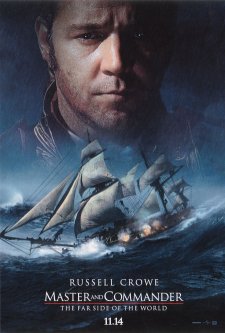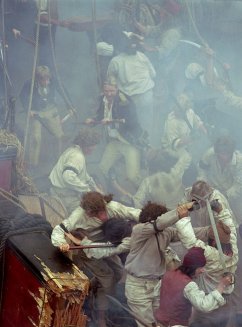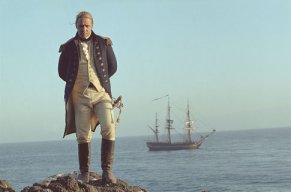|
Master
and Commander:
The Far Side of the World
Do you
remember a time when the French were considered a military
threat? Hard to believe, perhaps, but such a fact fuels the
plot of Master and Commander: The Far Side of the World.
Culled
from two separate novels (hence the unwieldy title) and tweaked
to change the threat from us to the French, Peter Weir's
latest definitely has a literate feel to it. Though chock
full of action, it's really more of a character study, with
a plot that rides a tide of story and just sort of ends. But
it doesn't really matter, because Weir has sucked you so thoroughly
into this world that it's not just the ending that sneaks
up on you. No, it's also the idea that this leisurely paced
tale is also one of the most satisfying movies of the year.
Russell
Crowe anchors the picture as Captain Lucky Jack Aubrey. Larger
than life only when he has to be, Aubrey commands the HMS
Surprise, on a mission to capture a French vessel, the Acheron,
in the Napoleonic Wars. And really, that's all this movie
is about, easily summed up in title cards before we zoom in
to the early dawn on deck.
Searching
for an enemy ship in the early 19th Century seems more a game
of blind man's bluff on a large Atlantic Ocean, and so Weir
focuses most of his attention on life at sea. For canny reasons,
we rarely even see the enemy as anything other than a shape
in the fog, dubbed "The Phantom" by an increasingly superstitious
crew.
Over
the course of an hour or so, Weir delivers vignettes that
seem only tenuously connected by taking place on the same
ship. But each one builds our understanding of the men and
boys sailing on the Surprise, with a domino effect. 13-year-old
Lord Blakeney (Max Pirkis) loses an arm early on, but never
loses sight of his duty and ambition. A grizzled old sailor
gets a metal coin screwed to his skull (ah, 19th Century medicine…),
and when he recovers, begins feeding the fears of the crew
with ravings that get more and more sane.
Friendships
are put to the test, no more so than that between Aubrey and
the ship's doctor, Stephen Maturin (Paul Bettany). The most
crucial of relationships in the movie, this odd pairing allows
for some of the film's themes to be most brightly illustrated.
Maturin is at odds ideologically with the whole concept of
war, since it often reduces him to little more than a butcher.
But he also prods and challenges Aubrey into being the best
leader he can possibly be, always wary of power corrupting.
The crew
follows "Lucky" Jack without question, but Weir, working from
his script co-written by John Collee, carefully exposes how
hard it is to be worthy of such loyalty. Aubrey does deserve
the devotion, but a lesser film (and a lesser actor) would
not have allowed room for question.
In the
heat of battle, it's clear that Aubrey has to make agonizing
decisions. Though the film doesn't linger on them (because
life can't), the Captain lives with the consequences. One
such involves a choice between trying to save a crewman washed
overboard, who earlier provided a clue for how Aubrey could
defeat the Acheron. With a broken mast the sailor's only apparent
hope for survival, it also becomes clear that the ship will
sink unless they cut it loose. Aubrey shoulders the responsibility;
his axe is the first to fall, and the drowning man's best
friend steps up to help.
It's
an emotionally stunning moment, one of many provided by the
film. The timing couldn't be more perfect, either. Riding
a renewed popularity of pirates (dismissed in a line of dialogue),
it's interesting to see what the real heroes of the time were
doing. But also, we need to see the price of leadership presented
simply, and perhaps, inspiringly.
Regardless
of his offscreen personality (and who really knows, anyway?),
Crowe continues proving himself a movie star who is also a
fine actor. Eschewing excessive antics, his Aubrey runs the
gamut of emotion. Forget Vin Diesel; this is a man.
Countering
Crowe, Bettany underplays with a delicacy, offering a man
of peace who still has no less steel. A scene with Maturin
removing a bullet from his own belly surely proves it, and
the genuine warmth and affection between the two main characters
leaps off the screen. By the power of two fine actors, we
understand how men can disagree and still have a deep respect
for each other, another lesson our culture could stand to
learn.
But Master
and Commander is too good a film to just beat us over
the head with such themes. In the thick of things, they're
not obvious. By the end, though, they appear in the consciousness
just like a great ship out of the fog.
You'll
be glad you took the ride.
Rating:

|








